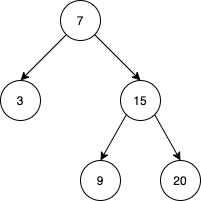Implement the BSTIterator class that represents an iterator over the
in-order
traversal of a binary search tree (BST):
BSTIterator(TreeNode root)Initializes an object of theBSTIteratorclass. Therootof the BST is given as part of the constructor. The pointer should be initialized to a non-existent number smaller than any element in the BST.boolean hasNext()Returnstrueif there exists a number in the traversal to the right of the pointer, otherwise returnsfalse.int next()Moves the pointer to the right, then returns the number at the pointer.boolean hasPrev()Returnstrueif there exists a number in the traversal to the left of the pointer, otherwise returnsfalse.int prev()Moves the pointer to the left, then returns the number at the pointer.
Notice that by initializing the pointer to a non-existent smallest number, the first
call to next() will return the smallest element in the BST.
You may assume that next() and prev() calls will always be
valid. That is, there will be at least a next/previous number in the in-order
traversal when next()/prev() is called.
Follow up: Could you solve the problem without precalculating the values of the tree?
Example 1:

Input ["BSTIterator", "next", "next", "prev", "next", "hasNext", "next", "next", "next", "hasNext", "hasPrev", "prev", "prev"] [[[7, 3, 15, null, null, 9, 20]], [null], [null], [null], [null], [null], [null], [null], [null], [null], [null], [null], [null]] Output [null, 3, 7, 3, 7, true, 9, 15, 20, false, true, 15, 9] Explanation // The underlined element is where the pointer currently is. BSTIterator bSTIterator = new BSTIterator([7, 3, 15, null, null, 9, 20]); // state is [3, 7, 9, 15, 20] bSTIterator.next(); // state becomes [3, 7, 9, 15, 20], return 3 bSTIterator.next(); // state becomes [3, 7, 9, 15, 20], return 7 bSTIterator.prev(); // state becomes [3, 7, 9, 15, 20], return 3 bSTIterator.next(); // state becomes [3, 7, 9, 15, 20], return 7 bSTIterator.hasNext(); // return true bSTIterator.next(); // state becomes [3, 7, 9, 15, 20], return 9 bSTIterator.next(); // state becomes [3, 7, 9, 15, 20], return 15 bSTIterator.next(); // state becomes [3, 7, 9, 15, 20], return 20 bSTIterator.hasNext(); // return false bSTIterator.hasPrev(); // return true bSTIterator.prev(); // state becomes [3, 7, 9, 15, 20], return 15 bSTIterator.prev(); // state becomes [3, 7, 9, 15, 20], return 9
Constraints:
- The number of nodes in the tree is in the range
[1, 105]. 0 <= Node.val <= 106- At most 105 calls will be made to
hasNext,next,hasPrev, andprev.
Difficulty:
MediumLock:
PrimeCompany:
UnknownProblem Solution
1586-Binary-Search-Tree-Iterator-IIAll Problems:
Link to All Problems
All contents and pictures on this website come from the Internet and are updated regularly every week. They are for personal study and research only, and should not be used for commercial purposes. Thank you for your cooperation.